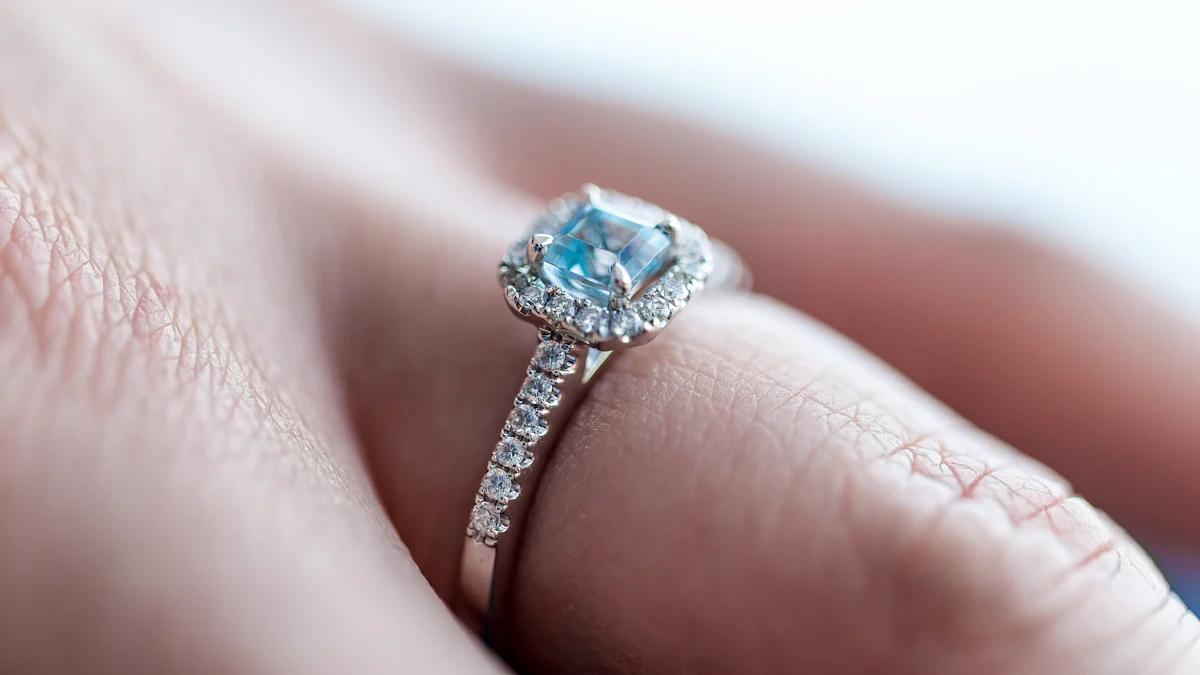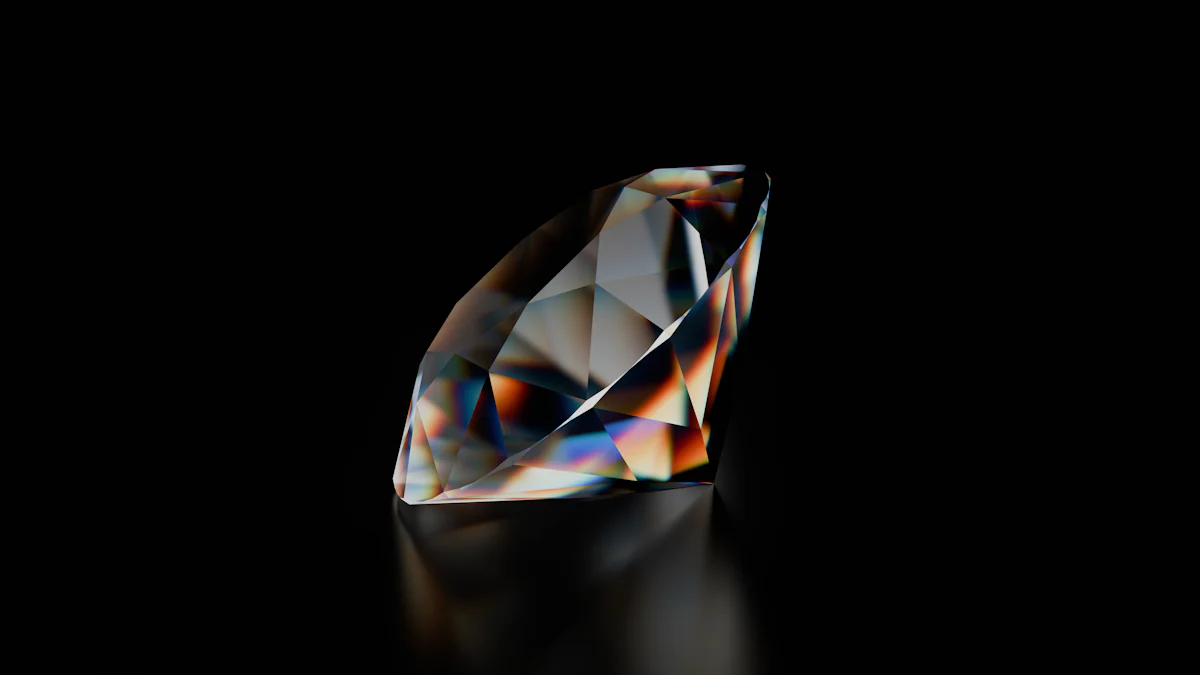What Does H Mean in Diamond Grading?

When you explore the world of diamonds, understanding diamond grading becomes essential. This process helps you determine a diamond's quality and value. One crucial aspect of grading is the color grade, which significantly impacts a diamond's appearance and price. Among these grades, you might wonder, what does H mean in diamonds? The "H" color grade represents a near-colorless diamond, offering an excellent balance between appearance and affordability. These diamonds appear almost colorless to the naked eye, making them a popular choice for those seeking beauty without breaking the bank.
Understanding Diamond Color Grading

The GIA Color Scale
Overview of the scale
The Gemological Institute of America (GIA) developed a color scale to grade diamonds. This scale ranges from D to Z, with D representing completely colorless diamonds and Z indicating noticeable color. The scale helps you understand how a diamond's color affects its appearance and value.
Position of "H" on the scale
The "H" color grade sits in the near-colorless range, specifically in the second tier. It follows grades D, E, and F, which are considered colorless. An H color diamond appears almost colorless to the naked eye, making it a popular choice for those who want beauty without the high cost of higher grades.
How Color Affects Diamond Appearance
Visual impact of color
Color plays a crucial role in a diamond's visual appeal. Even a slight tint can change how a diamond looks. In the case of H color diamonds, the faint yellow hue is usually undetectable unless compared directly to higher grades. This subtlety allows H color diamonds to maintain a bright and appealing appearance.
Perception of "H" color in different settings
When you place an H color diamond in a setting, it often appears white, especially in metals like platinum or white gold. The setting can enhance the diamond's near-colorless quality, making it look more vibrant. In normal lighting, most observers will see an H color diamond as colorless, which adds to its allure and value.
Characteristics of H Color Diamonds

Near-Colorless Quality
Definition and explanation
When you ask, "what does H mean in diamonds?" you're exploring a grade that offers a near-colorless appearance. H color diamonds sit just below the completely colorless grades of D, E, and F. This means they have a slight tint, often invisible to the naked eye. You enjoy the beauty of a diamond that appears almost colorless, providing an elegant look without the premium price.
Comparison with other grades
H color diamonds stand out for their affordability. Compared to D, E, or F color diamonds, H color diamonds are at least 20% cheaper. This makes them an attractive option if you're seeking quality without overspending. When compared to G color diamonds, H color diamonds offer a similar near-colorless appearance but at a more budget-friendly price. They also appear whiter than I color diamonds, giving you a balance between color quality and cost.
Impact on Diamond Value
Pricing considerations
The value of H color diamonds lies in their cost-effectiveness. You can acquire a diamond that looks nearly identical to higher-grade stones but at a fraction of the cost. This makes H color diamonds a smart choice if you're looking to maximize your budget. Their pricing reflects their position on the GIA color scale, offering a blend of beauty and savings.
Market demand for "H" color
H color diamonds enjoy strong market demand. Many buyers appreciate their near-colorless quality combined with affordability. These diamonds are popular for engagement rings, where appearance and cost both matter. By choosing an H color diamond, you align with a trend that values both elegance and economic sense.
Comparing H Color with Other Grades
H vs. G Color
Visual differences
When you compare H color diamonds to G color diamonds, the visual differences are subtle. Both grades fall within the near-colorless category on the GIA color scale. However, G color diamonds exhibit slightly less tint than H color diamonds. This difference is often imperceptible to the untrained eye, especially when the diamond is set in jewelry. The slight tint in H color diamonds becomes even less noticeable in round cuts, which can enhance their appearance.
Price comparison
The price difference between H and G color diamonds can be significant. H color diamonds offer a more budget-friendly option while maintaining a similar visual appeal to G color diamonds. You might find that H color diamonds cost less, making them an attractive choice if you want to balance quality and affordability. This cost-effectiveness makes H color diamonds a popular choice for those seeking value without compromising on appearance.
H vs. I Color
Visual differences
When you look at H color diamonds alongside I color diamonds, the visual differences become more apparent. I color diamonds have a more noticeable tint compared to H color diamonds. This tint can affect the diamond's overall appearance, especially in larger stones or certain settings. H color diamonds, with their near-colorless quality, often appear whiter and more vibrant than I color diamonds.
Price comparison
In terms of pricing, H color diamonds typically command a higher price than I color diamonds. This is due to their superior visual appeal and position on the GIA color scale. However, H color diamonds still offer excellent value, as they are significantly less expensive than completely colorless diamonds like those in the D, E, or F grades. By choosing an H color diamond, you can enjoy a balance of beauty and cost, making it a wise investment for many buyers.
Buying Guide for H Color Diamonds
Evaluating Quality
Importance of cut and clarity
When selecting an H color diamond, focus on the cut and clarity. The cut quality significantly influences the diamond's brilliance. A well-cut diamond reflects light beautifully, minimizing any visible color. This enhances the diamond's sparkle and makes it appear more vibrant. Clarity also plays a role in the diamond's overall appearance. While H color diamonds are near-colorless, ensuring high clarity will further enhance their visual appeal.
Certification and authenticity
Always verify the authenticity of your diamond with a reliable certification. The Gemological Institute of America (GIA) or the International Gemological Institute (IGI) provides trustworthy reports. These certifications confirm the diamond's color grade, cut, clarity, and carat weight. They ensure you receive a genuine product, maintaining the diamond's value and quality.
Tips for Buyers
Setting considerations
Consider the setting when purchasing an H color diamond. The right setting can enhance the diamond's appearance. Metals like platinum or white gold complement the near-colorless quality of H color diamonds. They create a contrast that makes the diamond appear whiter. The setting can also influence how the diamond's color is perceived, so choose one that highlights its best features.
Budgeting for "H" color diamonds
H color diamonds offer excellent value. They provide a balance between beauty and affordability. When budgeting, remember that these diamonds cost less than completely colorless ones. You can allocate more of your budget to other aspects, such as a higher carat weight or a more intricate setting. This approach allows you to maximize your investment while still acquiring a stunning diamond.
Common Misconceptions About H Color
Misunderstanding Color Visibility
Clarifying common myths
Many people believe that H color diamonds have a noticeable yellow tint. This misconception often arises from comparing them to higher-grade diamonds. In reality, the slight tint in H color diamonds is almost imperceptible to the naked eye. When set in jewelry, especially in platinum or white gold, these diamonds maintain a bright and appealing appearance.
Expert insights
Expert Gemologists state, "A keen eye is needed to see even the slightest color variations in H color diamonds." This subtlety makes them aesthetically pleasing and valuable. Consulting with an expert can help you appreciate the true beauty of H color diamonds.
Value Perception
Addressing misconceptions
Some buyers think H color diamonds lack value due to their position on the GIA color scale. However, these diamonds offer an excellent balance of quality and affordability. They provide a near-colorless appearance without the premium price of completely colorless stones.
Real-world examples
Consider the popularity of H color diamonds in engagement rings. Many choose them for their ability to appear colorless in various settings. As Expert Gemologists note, "H color diamonds are favored for their value and appearance in a wide range of styles." This trend highlights their appeal to those seeking both elegance and economic sense.
Understanding the significance of the "H" color grade in diamond grading can greatly enhance your purchasing decisions. H color diamonds offer a harmonious blend of purity and affordability, making them a wise choice for those seeking value without compromising on quality. These diamonds provide a near-colorless appearance that appeals to many buyers, especially for engagement rings. Consider exploring H color diamonds further to appreciate their balance of beauty and cost. Whether you're buying for yourself or a loved one, these diamonds promise elegance and economic sense.
See Also
Decoding Diamond Shapes for Engagement Bands
The Size of a 2.25 Carat Diamond
Exploring 18k Gold Herringbone Necklace Jewels

